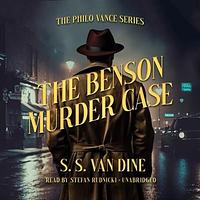Take a photo of a barcode or cover
Philo Vance was one the first fictional detective I met and I loved him.
I was happy to reread this story and I found as fascinating as usual.
I think it's an interesting depiction of an era.
Highly recommended.
Many thanks to the publisher and Edelweiss for this ARC, all opinions are mine
I was happy to reread this story and I found as fascinating as usual.
I think it's an interesting depiction of an era.
Highly recommended.
Many thanks to the publisher and Edelweiss for this ARC, all opinions are mine
Having listened to many many episodes of Philo Vance on the old time radio channel I decided to give the books a try. The story itself is a pretty good one. The writing is most annoying for the abbreviations far far too liberally used throughout. The vocabulary is interesting, being 85 years out of date now. That makes part of it just not what we're used to or what we use and makes part of it higher level than what is common now since we've suffered a serious dumbing down at the hands of unionized education. I'd like to give it 3.5 stars but since I can't take off half a star for the extremely excessive and annoying abbreviations I'll go with 4.
Es un cuatro raspado, porque entiendo que parte de la gracia de la novela era demostrar que el método psicológico de Philo Vance funciona, pero a veces lo ciegos, cabezotas y densos que eran los policías me sacaba un poco de quicio. También el hecho de que Philo se guardara información para sí, aunque al final explica por qué lo hizo y se lo perdono.
Hacia las tres cuartas partes de la novela, cuando el fiscal del distrito y amigo de Philo ya se fía de él, todo discurre con mucha más naturalidad y se da paso a una resolución tal vez algo previsible, pero ingeniosa, y que en mi caso no decepciona.
Sin duda es un misterio clásico, que en vez de basarse en la deducción fría y las pistas comos otros detectives, se basa en la figura de Philo Vance, un "diletante"culto, irónico y flemático que estudia los crímenes como si de obras de arte se tratara, reconociendo al auto no por las pistas, sino por la impronta personal del autor.
Aunque el hecho de que los policías y el fiscal se agarraran a su forma de investigar aún cuando Philo había acertado varias veces me molestó un poco, lo cierto es que la novela me ha divertido mucho y creo que los amantes del género lo encontraran una lectura interesante y entretenida. Y a Philo Vance un detective carismático y distinto a muchos.
Hacia las tres cuartas partes de la novela, cuando el fiscal del distrito y amigo de Philo ya se fía de él, todo discurre con mucha más naturalidad y se da paso a una resolución tal vez algo previsible, pero ingeniosa, y que en mi caso no decepciona.
Sin duda es un misterio clásico, que en vez de basarse en la deducción fría y las pistas comos otros detectives, se basa en la figura de Philo Vance, un "diletante"culto, irónico y flemático que estudia los crímenes como si de obras de arte se tratara, reconociendo al auto no por las pistas, sino por la impronta personal del autor.
Aunque el hecho de que los policías y el fiscal se agarraran a su forma de investigar aún cuando Philo había acertado varias veces me molestó un poco, lo cierto es que la novela me ha divertido mucho y creo que los amantes del género lo encontraran una lectura interesante y entretenida. Y a Philo Vance un detective carismático y distinto a muchos.
I was listening to a podcast about the Elwell murder case, and they mentioned that it was the same case that inspired this book. I had fond memories of reading some of my dad's mystery books about an American amateur sleuth, so I decided to get the ebook of the Benson Murder Case. After a few chapters, a few things became apparent:
1) S.S. Van Dine couldn't write at all;
2) Philo Vance is a pompous ass;
3) my dad read Ellery Queen.
This is a bad book. I can't overstate how bad it is. The prose contains some of the worst sentences I've been unfortunate to encounter in my life, and my work involves reading a lot of Facebook post. Van Dine can't handle more than two characters in a scene. Several times, two characters are doing something, and then he cuts back to a third to relate what he was doing while the other two were doing something else. Not to mention the narrator, his own alter ego, who shadows Philo Vance for the entire book without ever saying a word or doing anything aside from looking at things. At one point he gives up entirely on trying to describe what the characters are even doing, and an entire dialogue is in script form.
The plot itself is mostly nonexistent. All the interesting details about the murder are copied from the Elwell murder case, which was a famous unsolved crime of that time. The solution itself is painfully obvious from the first time the murderer appears, thanks to the ineptitude of the writer. All that remains is follow along while Philo Vance jerks his supposed friend Markham around, and lets innocent people be arrested while he imparts nuggets of wisdom such as "women can't shoot people in cold blood, don't'cha know old chap, eh what?"
Some books don't age well. This book was crap in the 1920s. Don't read this drivel.
1) S.S. Van Dine couldn't write at all;
2) Philo Vance is a pompous ass;
3) my dad read Ellery Queen.
This is a bad book. I can't overstate how bad it is. The prose contains some of the worst sentences I've been unfortunate to encounter in my life, and my work involves reading a lot of Facebook post. Van Dine can't handle more than two characters in a scene. Several times, two characters are doing something, and then he cuts back to a third to relate what he was doing while the other two were doing something else. Not to mention the narrator, his own alter ego, who shadows Philo Vance for the entire book without ever saying a word or doing anything aside from looking at things. At one point he gives up entirely on trying to describe what the characters are even doing, and an entire dialogue is in script form.
The plot itself is mostly nonexistent. All the interesting details about the murder are copied from the Elwell murder case, which was a famous unsolved crime of that time. The solution itself is painfully obvious from the first time the murderer appears, thanks to the ineptitude of the writer. All that remains is follow along while Philo Vance jerks his supposed friend Markham around, and lets innocent people be arrested while he imparts nuggets of wisdom such as "women can't shoot people in cold blood, don't'cha know old chap, eh what?"
Some books don't age well. This book was crap in the 1920s. Don't read this drivel.


